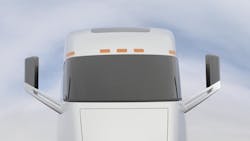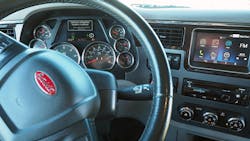You’d be forgiven for thinking the rapid imposition of electronic logging devices (ELDs), mobile freight applications, Uber for trucking services, and the still-in-development autonomous truck is part of a “master plan” to remove humans from the business of moving cargo.
Indeed, when it comes to self-driving trucks, that’s one of the main fears voiced by many industry participants.
Yet, Drew McElroy, CEO of technology platform provider Transfix, thinks that view is mistaken.
He believes the digitization of trucking is but the natural progression of similar efforts occurring in other industries – think 3-D printing in manufacturing and e-commerce in the retail sector – while at the same time allowing for an overhaul of motor carrier practices that have changed little in half a century.
“You can’t just be an ostrich and ignore this – the world is changing, and it’s not due to any one human being,” he told Fleet Owner.
“It’s the unstoppable march of progress. For a long time, trucking was largely insulated from it. But it has turned very, very quickly,” McElroy stressed. “What many in logistics may not realize is not only how ubiquitous trucking is, but that there are not many $700 billion industries out there today. And here we have this industry sitting here, largely the same for 50 years.”
And while he completely understands why many truckers view technology like ELDs equipped with GPS tracking systems as Big Brother invading their privacy – “I acutely understand this; my dad owned a trucking company and had a ‘don’t tread on me’ mentality” – McElroy stressed that freight and the time required to move it is too valuable to leave unmonitored.
“Yes, you have quarter of million invested in your truck and trailer, but you are carrying a quarter of a million worth of freight on it. Sorry, the people who own that stuff want to know where it is,” he pointed out.
But it’s also about building better algorithms through technology to make load/truck matches as efficient as possible and as profitable as possible for all concerned.
“We are continuing to move drivers with as little deadhead as possible and help them set their next loads up as simply as possible,” McElroy explained.
“Look, the more the computer can think on our behalf and we all agree on [freight] rules, the better it is for everyone. If we do our job correctly, it will literally take a driver or fleet 10 seconds to book a load with all the parameters they need,” he said. “That transparency doesn’t just make the work easier; it brings peace of mind. The systems makes all the matches for you and takes care of the money; all you have to do drive.”
Yet that’s also a trend that will create major upheaval in the back office of trucking as well, argues John Larkin, managing director and head of transportation capital markets research for Stifel Capital Markets.
“Truck brokers will either be made more productive, or in many cases, rendered unnecessary as data analytics, artificial intelligence, and machine learning ultimately combine to eliminate many of the manual functions currently performed by human labor at truck brokerage operations,” he explained in a recent research brief.
“Also, Blockchain technology seems poised to ultimately replace clerical and administrative activities focused on billing, rating, contract administration, shipment tracking, appointment setting, etc.,” he added. “Within five to 20 years – depending on the task automated – we believe that automation will be broadly enough applied across the global and national supply chains to eliminate, or at least greatly diminish, the labor shortage currently hampering supply chain capacity.”
About the Author
Sean Kilcarr
Editor in Chief
Sean Kilcarr is a former longtime FleetOwner senior editor who wrote for the publication from 2000 to 2018. He served as editor-in-chief from 2017 to 2018.

